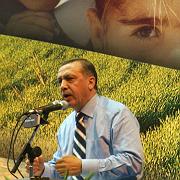

The Turkish government has long been promising to steer money to its impoverished southeast. On Tuesday, Prime Minister Recep Tayyip Erdogan finally made good on the pledge and unveiled a multi-billion euro investment package for the region, largely populated by the country's sizeable Kurdish minority.
Erdogan, who travelled to Diyarbakir, the largest city in the region, to present the plan, said that 14.55 billion lira (€7.6 billion, $11.6 billion) would come out of the government budget between 2008 and 2012 and an additional 12.2 billion lira would come from other sources, according to the Associated Press. The plan calls for the region, which has long been plagued by a violence Kurdish separatist movement, to receive improved infrastructure and irrigation.
"The enemy of terrorism is an environment of welfare and freedom," Erdogan said. "As welfare spreads and freedom is strengthened … it is the terrorist organization which loses."
The move comes following a period of at times intense cross border attacks as the Turkish military has tried to destroy bases belonging to the Kurdistan Workers Party (PKK) located in the mountains of northern Iraq. In addition to air strikes, Turkish troops marched into Iraq in February.
Erdogan had said in 2005 that his government was planning to increase its investment in the region, but he took few concrete steps to follow up on the promise. The European Union, however, has long pressured Ankara to improve Kurdish rights in Turkey. Erdogan said on Tuesday that a state television channel offering programming in Kurdish and other minority languages was being planned.
Turkey still faces an uphill battle with its EU accession ambitions, despite formal accession negotiations having begun in October 2005. Turkish Foreign Minister Ali Babacan was in Brussels on Tuesday to meet with EU officials, but did not sound optimistic about the progress of talks. He said that repeated European efforts to renege on the promise of Turkish membership "wear down the enthusiasm to carry forward reforms."
His comment was widely interpreted as a reference to France, which has recently objected to EU-Turkey talks being labelled as "accession negotiations."
Erdogan and Babacan are also under pressure at home amid a legal bid to ban their political party, the Justice and Development Party. Critics claim that the party is rooted in Islamism and that it is eroding Turkey's secular ideals. The EU has expressed concern about the attempt to ban the ruling party and EU Enlargement Commissioner Olli Rehn on Tuesday once again criticized the effort.
The investment package for south-east Turkey focuses on a widening of the Southeast Anatolia Project (GAP) which includes a number of dams and hydro-electric facilities. The controversial Ilisu Dam, lampooned by many in Europe due to the fact that the resulting reservoir will submerge the ancient Kurdish town of Hasankeyf, is part of that plan. Some have criticized Ankara for wanting to destroy Kurdish heritage. But Erdogan's party has made electoral advances in southeastern Turkey and is hoping that the additional investment will produce ballot-box successes in municipal elections next March.
cgh/AP/AFP


